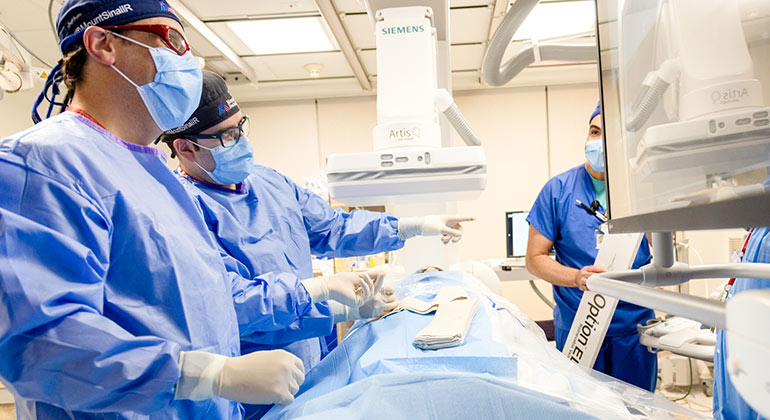Hemorrhoids

Hemorrhoids are caused by increased blood flow to the rectum and can significantly affect your quality of life. Almost half of all men and women will develop hemorrhoids by age 50. They can cause severe pain, itching, bleeding, and a feeling of fullness or discomfort. While some hemorrhoids can be treated with dietary or lifestyle changes, others will require a procedure.
The Procedure
At Mount Sinai, we use a minimally invasive procedure to treat hemorrhoids called Hemorrhoid Artery Embolization (HAE). This approach requires placing a small IV catheter into an artery in the wrist.
Once we have access, using real-time image guidance we direct a catheter down to the arteries in the pelvis that supply blood to your hemorrhoids. We use this catheter to insert embolic agents--small particles and coils--which restrict the blood flow to the hemorrhoids. The procedure is safer and easier than traditional surgery and takes less than an hour.
What to Expect
We use conscious sedation, also called “twilight” sedation, rather than general anesthesia for hemorrhoid artery embolization. Not only is conscious sedation safer than general anesthesia with fewer side effects, but it allows you to recover and go home more quickly after the procedure.
Nearly all patients go home the same day after a 1-2 hour recovery time with just a small bandage on their wrist. Normal activities can be resumed the next day. Because it is less invasive, hemorrhoid artery embolization has fewer complications than traditional surgery.
You should feel significant improvement within a week and some patients don’t require any further treatment after this procedure. You will follow up with your doctor after the procedure in the office.
Who Is a Good Candidate?
You are a good candidate for hemorrhoid artery embolization if:
- You have bleeding hemorrhoids
- Special diets, creams, and other non-invasive treatments do not work or have stopped working
- You desire a quick recovery time and would like to avoid major surgery